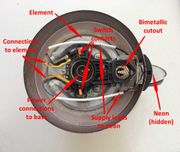Translations:Kettles, electric urns and rice boilers/11/en: Difference between revisions
(Importing a new version from external source) |
(Importing a new version from external source) |
||
| Line 1: | Line 1: | ||
[[File:Kettle Mechanism.jpg|180px|thumb|right|The mechanism in the base of a kettle.]] | [[File:Kettle Mechanism.jpg|180px|thumb|right|The mechanism in the base of a kettle.]] | ||
Most automatic kettles work by providing a path for the steam, as they come to the boil, over a [[wikipedia:Bimetallic_strip|bimetallic]] strip or popping disk which bends under the heat, so flicking off the switch. Newer models have an electronic sensor that triggers the switch when the desired temperature is reached. | |||
Latest revision as of 16:16, 31 March 2024
Most automatic kettles work by providing a path for the steam, as they come to the boil, over a bimetallic strip or popping disk which bends under the heat, so flicking off the switch. Newer models have an electronic sensor that triggers the switch when the desired temperature is reached.
